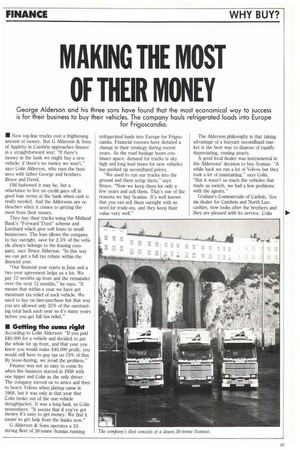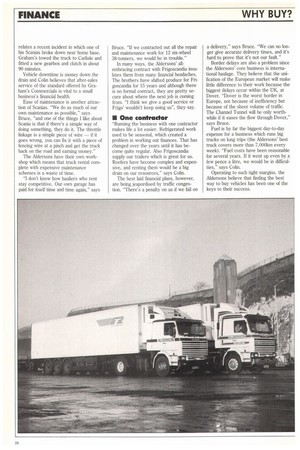MAKING THE MOST OF THEIR MONEY
Page 135

Page 136

If you've noticed an error in this article please click here to report it so we can fix it.
• New top-line trucks cost a frightening amount of money. But G Alderson & Sons of Appleby in Cumbria approaches finance in a straightforward way: "If there's money in the bank we might buy a new vehicle; if there's no money we won't," says Colin Alderson, who runs the business with father George and brothers Bruce and David.
Old fashioned it may be, but a reluctance to live on credit pays off in good loan terms at the bank when cash is really needed. And the Aldersons are no slouches when it comes to getting the most from their money.
They buy their trucks using the Midland Bank's "Forward Trust" scheme and Lombard which give soft loans to small businesses. The loan allows the company to buy outright, save for 2.5% of the vehicle always belongs to the leasing company, says Bruce Alderson. "In this way we can get a full tax rebate within the financial year.
"Our financial year starts in June and a two-year agreement helps us a lot. We pay 12 months up front and the remainder over the next 12 months," he says. "It means that within a year we have got maximum tax relief of each vehicle. We used to buy on hire-purchase but that way you are allowed only 25% of the outstanding total back each year so it's many years before you get full tax relief."
I Getting the sums right
According to Colin Alderson: "If you paid ,40,000 for a vehicle and decided to put the whole lot up front, and that year you knew you would make £40,000 profit, you would still have to pay tax on 75% of that. By lease-buying, we avoid the problem."
Finance was not so easy to come by when the business started in 1956 with one tipper and Colin as the only driver. The company moved on to artics and then to heavy Volvos when plating came in 1968, but it was only in that year that Colin broke out of the one-vehicle straightjacket. It was a long haul, as Colin remembers: "It seems that if you've got money it's easy to get money. We find it easier to get help from the banks now."
G Alderson & Sons operates a 12strong fleet of 38-tonne Scanias running refrigerated loads into Europe for Frigoscandia. Financial reasons have dictated a change in their strategy during recent years. As the road haulage boom continues apace, demand for trucks is sky high and long lead times for new vehicles has pushed up secondhand prices.
"We used to run our trucks into the ground and them scrap them," says Bruce. "Now we keep them for only a few years and sell them. That's one of the reasons we buy Scanias. It's well known that you can sell them outright with no need for trade-ins, and they keep their value very well." The Alderson philosophy is that taking advantage of a buoyant secondhand market is the best way to dispose of rapidly depreciating, rusting assets.
A good local dealer was instrumental in the Aldersons' decision to buy Scanias. "A while back we ran a lot of Volvos but they took a lot of maintaining," says Colin. "But it wasn't so much the vehicles that made us switch, we had a few problems with the agents."
Graham's Commercials of Carlisle, Scania dealer for Cumbria and North Lancashire, now looks after the brothers and they are pleased with its service. Colin relates a recent incident in which one of his Scanias broke down near home base. Graham's towed the truck to Carlisle and fitted a new gearbox and clutch in about 90 minutes.
Vehicle downtime is money down the drain and Colin believes that after-sales service of the standard offered by Graham's Commercials is vital to a small business's financial health.
Ease of maintenance is another attraction of Scanias. "We do as much of our own maintenance as possible," says Bruce, and one of the things I like about Scania is that if there's a simple way of doing something, they do it. The throttle linkage is a simple piece of wire — if it goes wrong, you can fix it with a piece of fencing wire at a pinch and get the truck back on the road and earning money."
The Aldersons have their own workshop which means that truck rental complete with expensive maintenance schemes is a waste of time.
"I don't know how hauliers who rent stay competitive. Our own garage has paid for itself time and time again," says Bruce. "If we contracted out all the repair and maintenance work for 12 six-wheel 38-tormers, we would be in trouble."
In many ways, the Aldersons' allembracing contract with Frigoscandia insulates them from many financial headaches. The brothers have shifted produce for Frigoscandia for 15 years and although there is no formal contract, they are pretty secure about where the next job is coming from. "I think we give a good service or Frigo' wouldn't keep using us", they say.
• One contractor
"Running the business with one contractor makes life a lot easier. Refrigerated work used to be seasonal, which created a problem in working out finances. That has changed over the years until it has become quite regular. Also Frigoscandia supply our trailers which is great for us. Reefers have become complex and expensive, and renting them would be a big drain on our resources," says Colin.
The best laid financial plans, however, are being jeapordised by traffic congestion. "There's a penalty on us if we fail on a delivery," says Bruce. "We can no longer give accurate delivery times, and it's hard to prove that it's not our fault."
Border delays are also a problem since the Aldersons' core business is international haulage. They believe that the unification of the European market will make little difference to their work because the biggest delays occur within the UK, at Dover. "Dover is the worst border in Europe, not because of inefficiency but because of the sheer volume of traffic. The Channel Tunnel will be only worthwhile if it eases the flow through Dover," says Bruce.
Fuel is by far the biggest day-to-day expense for a business which runs big trucks on long trips (the Aldersons' best truck covers more than 7,000km every week). "Fuel costs have been reasonable for several years. If it went up even by a few pence a litre, we would be in difficulties," says Colin.
Operating to such tight margins, the Aldersons believe that finding the best way to buy vehicles has been one of the keys to their success.




















































































































































